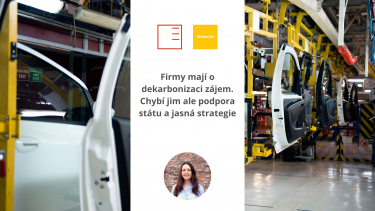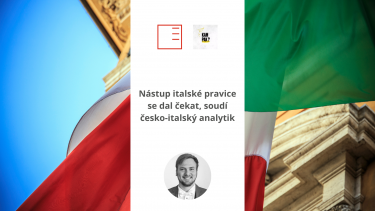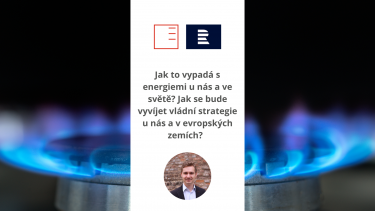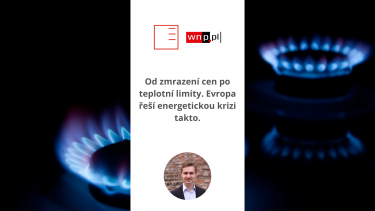EURACTIV: Companies are interested in decarbonisation but they lack government support and a clear strategy
According to experts, while decarbonisation is costly, without it the costs would be even higher. Our researcher Kateřina Davidová also commented on the topic at EURACTIV's Decarbonisation of the Czech and Slovak Economy 2022 conference.
Show more
INVITATION | Café Evropa: Disinformation - who spreads it and why?
We would like to invite you to another debate in the Café Evropa series, this time on the topic "Disinformation - who spreads it and why?" The debate will take place on 7 November at 17:30 online on our Facebook page.
Show moreiDNES.cz: Germans want to cap energy even for big companies, it may harm Czech firms
The German government plans to finance so-called price brakes, which are similar to the Czech price caps for consumers. The fundamental difference of the price brake in Germany is that it will also apply to large industrial enterprises. Our researcher Michal Hrubý commented on the situation.
Show moreEmpowering Serbian CSOs involved in the decarbonization process through the V4 experience
Read the background paper for the Belgrade conference, which focuses on the phasing out of coal mining in the V4 countries, to representatives of Serbian civil society. Our project manager and junior researcher Tatiana Mindekova worked on the paper on behalf of EUROPEUM Institute for European Policy.
Show more PDFCRo Plus: Mission of Reconciliation. Why are relations between France and Germany strained?
The originally scheduled regular meeting between the governments of France and Germany was eventually postponed. Could this be a signal of some major differences in relations between the countries? What are the causes of the contradictions? Are they more personal or political? What impact could it have if Paris and Berlin fail to agree on their position on China? Our senior research fellow Vít Havelka commented on the situation between the countries in the programme Odpolední Plus for Czech Radio Plus.
Show more
ČRo: What will be the first steps of the new Italian Prime Minister?
Italy has a new government headed by Giorgia Meloni. She took over from her predecessor Mario Draghi on Sunday and was sworn in by President Sergio Mattarella on Saturday. Meloni will lead Italy's most right-wing government since World War II, with Matteo Salvini of the right-wing League of the North party and Antonio Tajani of the conservative Up Italy party as her deputies. The first steps of the new Italian prime minister were outlined by our Associate Research Fellow Alexandr Lagazzi for Czech Radio.
Show more
CEENERGYNEWS | E-mobility, an opportunity for CEE: regional associations sign joint declaration
An article summarising the conference was published in the framework of the conference E-mobility: the Opportunity for Central Eastern Europe. An important milestone of the conference was the signing of a declaration by the leaders of the Czech Platform for Electromobility, the Polish Alternative Fuels Association and the Slovak Electric Vehicle Association.
Show more
Kam pak?: The rise of the Italian right was to be expected, says Czech-Italian analyst
Who is Giorgia Meloni? How much does she claim the legacy of Benito Mussolini? What will her government look like and what can it mean for Italy? For the podcast "Kam pak?" on the topic of Italy's incoming new government, commented our researcher and Italy expert, Alexandre Lagazzi.
Show more
ČRo: What is the energy situation in our country and in the world? How will the government strategy evolve here and in European countries? What about the world
The International Energy Agency said in its quarterly report that Europe will face unprecedented risks regarding Russian supplies and may be forced to compete with Asia for liquefied natural gas. Our research fellow Michal Hrubý discussed the European situation, including the Czech situation in this global context, with Martina Mašková.
Show moreWNP.PL: From price freezes to temperature limits. Here's how Europe is tackling the energy crisis.
The energy crisis is forcing European governments to reduce energy consumption, but also to introduce mechanisms to protect consumers from rising heat and electricity prices. Our research fellow Michal Hrubý commented on the situation in the EU. "The Czech Republic and Italy are trying to diversify their gas supplies but have not yet decided on radical measures to reduce consumption. " "France has a problem with an ageing fleet of nuclear power stations and may not have enough electricity this winter. " "The French government, like the Czech Republic, has introduced a price cap on household energy bills and has decided to compensate the poorest households with a cost of between €100 and €200. "
Show moreStaroměstské náměstí 4/1
Prague 1 - Staré Město
110 00
tel.: +420 212 246 552
email: europeum@europeum.org
https://www.europeum.org









